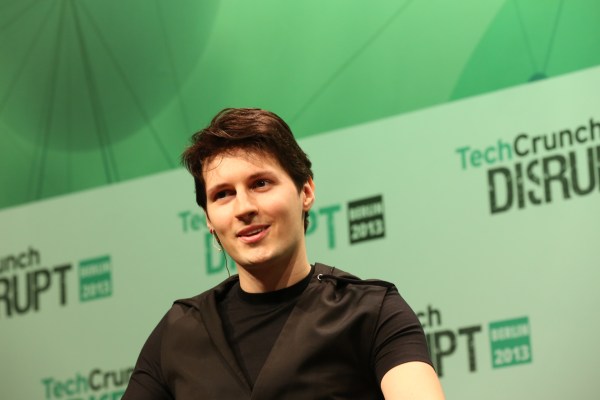Pavel Durov, the creator of Russia’s biggest social network VKontakte, is more than a little familiar with government surveillance.
On a prep call for a surprise appearance at TechCrunch Disrupt in Berlin today, he joked with co-editor Alexia Tsotsis to say “Hi” to government agents that he thought were listening on the call. His home and VKontakte’s offices were also both searched amid an investigation into a traffic incident that Durov has denied involvement in. The Russian government recently ended the investigation, without finding any wrongdoing.
That was perhaps one of the motivations for him to create Telegram, a new messaging app that he says is resistant to spying by companies and governments alike.
“We don’t have anything to show the government, because the encryption keys are generated on the device and exchanged purely between the devices, using difficult algorithms,” he said. “The server doesn’t really know what is content is being created.”
Telegram is based on a custom data protocol called MTProto built by Pavel’s brother Nikolai Durov, a mathematician. The app’s secret chats, a separate feature from its ordinary chats, use end-to-end encryption. They cannot be forwarded and can be set to self-destruct after a certain amount of time. One key difference between Telegram’s secret and ordinary chats is that secret chats are not stored in the app’s cloud, which means you can only access messages from their device of origin.
“The global threat of ‘Big Brother’ can actually be conquered purely by technology,” he said.
Durov was, of course, critical of recent reports that the U.S.’s National Security Agency has tapped into the phone calls or online communications of both U.S. citizens and foreign heads of state.
“I think the big difference between most countries and the U.S., is that governments are more straightforward now about their intentions to gather information on private communications,” he said.
His new app is part of a non-profit, instead of a for-profit or venture-backed enterprise. Durov said he chose this route because he wants to earn users’ trust.
“I hope some people will find this product useful and feel more safe,” he said.
[gallery ids="906475,906476,906478,906480,906481,906451,906468,906467,906466,906465,906463,906461,906460,906459,906458,906457,906456,906454,906453,906452"]
